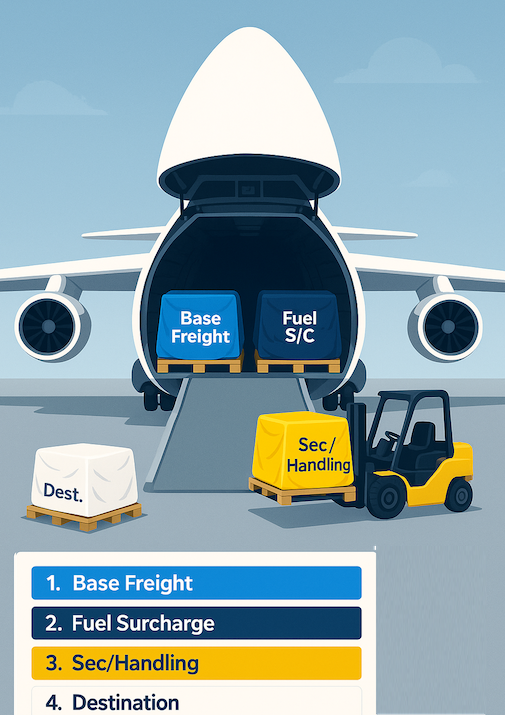Many small to mid-sized medical supply importers rely on air freight for speed and reliability, but costs can quickly erode margins if not managed carefully. Balancing express delivery with cost control requires advanced planning and effective partnerships.
Why is air freight cost management critical to medical supply importers?
Air freight is indispensable for medical suppliers moving high-value or time-sensitive goods. Programs like IATA’s CEIV Pharma highlight air’s critical role in handling temperature-controlled pharmaceuticals. Yet the expense is steep: air transport has historically run 12–16× more expensive than ocean freight (World Bank – Air Freight Study, though actual ratios vary).
For small to mid-sized importers, logistics costs flow straight into clinical availability and business health.
How does air freight cost management improve supply chain resilience?
Smarter freight management isn’t just about trimming expenses; it’s about making operational decisions that keep goods moving reliably. A clear example is dimensional weight pricing, where packaging design directly drives costs.
Ultimately, smarter freight management means stronger supply chains —and by extension, better patient outcomes.
So, how can importers cut costs without compromising reliability? By focusing on strategies that advance resilience, and efficiencies that enhance service quality.
Key Insights
- Air freight is essential for medical suppliers but dramatically more expensive than ocean.
- Rising transportation costs correlate with shortages that impact patient care (see ASHP via Axios – Drug Shortages, AP News – IV Fluid Shortages).
- Upstream supply chain choices—like shipment consolidation, package optimization and Incoterms—shape downstream expenses.
- Cost control doesn’t mean cutting corners; it means planning, packaging smartly, and partnering well.
How can importers manage key air freight cost drivers?
Understand cost components
Air freight invoices are made up of base rates, fuel surcharges, security/handling fees, and destinaton charges. Surcharges change weekly based on jet-fuel indexes (FedEx Fuel Surcharge, UPS Fuel Surcharge). Knowing the breakdown helps importers target efficiencies.
Consolidate shipments & plan ahead
Smaller, frequent shipments rack up costs. Consolidating into fewer, larger shipments lowers per-unit expense and may qualify for better rates. Timing also matters: shipping mid-week or overnight often costs less.
Optimize packaging
Carriers charge by whichever is greater: actual or dimensional (volumetric) weight. Lightweight but bulky boxes can double your bill. Using compact, stackable packaging reduces chargeable weight and improves pallet efficiency (UPS Chargeable & Volumetric Weight, Maersk – Chargeable Weight
Recommendation: Leverage Tools, Relationships & Terms
Use Digital Freight Platforms
Platforms like Freightos give smaller importers visibility once reserved for multinationals—carrier comparisons, transit times, and end-to-end cost transparency.
Build Carrier Partnerships & Secure Contracts
Contracts and steady partnerships secure space during shortages and provide predictable terms. In healthcare logistics, reliability is often more valuable than a short-term rate cut.
Select Incoterms Wisely
Choosing terms like FOB (Free-on-Board) or FCA (Free Carrier) ensures the importer—not the overseas supplier—controls carrier selection and routing. That often means better rates and visibility.
Key Takeaways
- Air freight can cost up to 16× more than ocean, so managing it is critical.
- Shipment consolidation, smart scheduling, and packaging optimization bring quick wins.
- Digital platforms increase transparency and control for smaller teams.
- Stable carrier partnerships and thoughtful Incoterms improve resilience.
Conclusion
Managing air freight costs isn’t about stripping service—it’s about making smarter choices. From understanding fuel surcharges to rethinking packaging, planning ahead, and leveraging digital tools, medical supply importers can keep shipments fast without losing margin.
For nearly 50 years, Dedola Global Logistics has helped small and mid-sized importers balance these trade-offs, keeping supply chains reliable, cost-effective, and resilient.
FAQ
Is air freight cheaper than ocean when time matters?
Yes. For critical medical supplies, faster delivery via air can outweigh higher transport costs by reducing inventory carry and preventing stockouts.
Can small importers benefit from platforms like Freightos?
Absolutely. Platforms reduce complexity and elevate bargaining power, even for single-office importers.
How much can packaging impact costs?
Highly. Charging is often based on dimensional weight. Efficient packaging can produce substantial savings.

About the Author
Marc Dedola continues the family legacy as CEO of Dedola Global Logistics. With decades of leadership in international freight forwarding, he is dedicated to helping clients succeed through dependable service and innovative logistics solutions.






